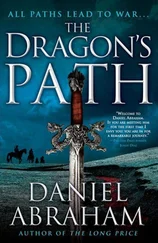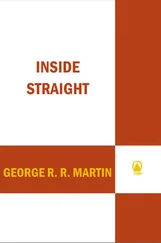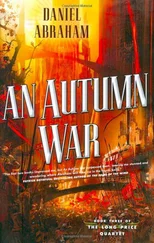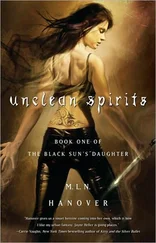Daniel Abraham - THE
Здесь есть возможность читать онлайн «Daniel Abraham - THE» весь текст электронной книги совершенно бесплатно (целиком полную версию без сокращений). В некоторых случаях можно слушать аудио, скачать через торрент в формате fb2 и присутствует краткое содержание. Жанр: Фэнтези, на английском языке. Описание произведения, (предисловие) а так же отзывы посетителей доступны на портале библиотеки ЛибКат.
- Название:THE
- Автор:
- Жанр:
- Год:неизвестен
- ISBN:нет данных
- Рейтинг книги:3 / 5. Голосов: 1
-
Избранное:Добавить в избранное
- Отзывы:
-
Ваша оценка:
- 60
- 1
- 2
- 3
- 4
- 5
THE: краткое содержание, описание и аннотация
Предлагаем к чтению аннотацию, описание, краткое содержание или предисловие (зависит от того, что написал сам автор книги «THE»). Если вы не нашли необходимую информацию о книге — напишите в комментариях, мы постараемся отыскать её.
THE — читать онлайн бесплатно полную книгу (весь текст) целиком
Ниже представлен текст книги, разбитый по страницам. Система сохранения места последней прочитанной страницы, позволяет с удобством читать онлайн бесплатно книгу «THE», без необходимости каждый раз заново искать на чём Вы остановились. Поставьте закладку, и сможете в любой момент перейти на страницу, на которой закончили чтение.
Интервал:
Закладка:
or town to another, living in the shadows. One more journey-and this one
heading south into the summer cities-hadn't seemed to signify anything
more than a few weeks' time and, of course, the errand itself. But
somewhere in the years since the Galtic invasion, Maati had grown
accustomed to traveling with companions, and as he and his swaybacked
pack mule had made their slow way down the tracks and low-town roads, he
had felt their absence.
The world had changed in the years he had been walking through it.
Having no one there to talk with forced his mind back in on itself, and
the nature of the changes he saw were more disturbing than he'd thought
they would be.
Many were things he had expected. The cities and towns had grown
quieter, undisturbed by the laughter and games of children. The people
were older, grayer. The streets felt too big, like the robes of a
once-hale man who had grown thin with illness or age. And the scars of
the war itself-the burned towns already half-reclaimed by foxes and
saplings, the bright green swath from Utani all the way down to ruined
Nantani on the southern coast where once an army had passed-had faded,
but they had not disappeared.
The distrust of the foreign was driven deep into the flesh here. He had
heard stories of Westlands women coming to marry among the low towns,
thinking their wombs would make them of greater value here than in their
own lands. Instead, they were recognized as a slower kind of invasion.
Driven out with threats or stones. The men who had had the temerity to
marry outside their own kind punished in ways to rival the prices paid
by failed poets. Joints broken, drowned in night pots, necks snapped,
and bodies thrown into creeks to drown in half a hand's depth of water.
And yet, the stories might only be stories. The more Maati traveled, the
less certain he was.
Twice, great belching steam wagons had passed him on the trail. The men
at the controls had been locals, but the machines themselves were
Galtic, remnants of the war. Once he had seen plumes of smoke and steam
rising from the river itself, a flat barge sitting low to the water and
driven by the same chuffing, tarnished bulb as the wagons. Even the
fields below him now were cultivated in a pattern he had never seen
before the Galts came. Perhaps Otah's betrayal of the cities colored all
of Maati's perceptions now, but it felt as if the Galts were invading
again, only slowly this time, burrowing under the ground and changing
all they touched in small, insidious ways.
Something tickled his arm. Maati plucked out the tick and cracked it
between his thumbnails. He was wasting time. His feet ached from walking
and his robe stuck to his back and legs, but the sooner this meeting
happened, the sooner he would know where he stood. He emptied the last
of the seeds into his hand, ate them, then put the pouch back in his
sleeve and untied his mule.
Seven years before, he and Cehmai had parted for the last time at a
wayhouse three days' walk northwest of the farms and the river and
catalpa-shaded hill. It had not been an entirely friendly parting, but
they had agreed to leave letters of their whereabouts at that house,
should the need ever arise to find each other.
Maati had found the place easily. In the intervening years, the kitchens
had burned, and the two huge trees in the courtyard. The boy who stabled
the horses had grown to be a man. The bricks that had been brown and
yellow had been painted white and blue. And the box they had paid the
keeper to hold for them had a letter in it, sewn and sealed, with
ciphered directions that would lead to the farmhouse Cehmai had taken
under his new false name. Jadit Noygu.
Jadit Noygu, and his wife Sian.
Maati took the letter out again, consulting the deciphered text he'd
marked in between the lines written in Cehmai's clean, clear hand.
Forward down the track until he passed the ruin of an old mill, then the
first east-turning pathway, and half a hand's walk to a low
mud-and-straw farmhouse with a brick cistern in front. Maati clucked at
the mule and resumed his walk.
He arrived in the heat of the afternoon; even the shade beneath the
trees sweltered. Maati helped himself to a bowl of water from the
cistern, and then another bowl for the mule. No one came out to greet
him, but the shutters on the windows looked recently painted and the
track that led around the side of the house was well-tended. There was
no sense that the farm stood empty. Maati made his way toward the back.
A small herd of goats bleated at him from their pen, the disturbing,
clever eyes considering him with as little joy as he had for them. The
low sound of whistling came to him from a tall, narrow building set
apart from both house and pen. A slaughterhouse.
He stepped into the doorway, blocking the light. The air was thick with
smoke to drive the flies away. The body of the sacrificed goat hung from
a hook, buckets of blood and entrails at the butcher's feet. The butcher
turned. Her hands were crimson, her leather apron sodden with blood. A
hooked knife flashed in her hand.
She was not the only reason that Maati and Cehmai had parted company,
but she would have been sufficient. Idaan Machi, outcast sister to the
Emperor. As a girl no older than Vanjit was now, Idaan had plotted the
slaughter of her own family in a bloody-minded attempt to win Machi for
herself and her husband. Otah had come near to being executed for her
crimes, Cehmai had been seduced and used by her, and Maati still had a
thick scar on his belly where her assassin had tried to gut him. Otah,
for reasons that passed beyond Maati's understanding, had spared the
murderess. Even less comprehensible, Cehmai had found her, and in their
shared exile, they had once again become lovers. Only Maati still saw
her for what she was.
Age had thickened her. Her hair, tied back in a ferocious knot, was more
gray than black. Her long, northern face showed curiosity, then
surprise, then for less than a heartbeat something like contempt.
"You'll want to see him, then," said Otah's exiled sister: the woman who
had once set an assassin to kill Maati. Who had blamed Otah for the
murders she and her ambitious lover had committed.
She sank the gory knife into the dead animal's side, setting the corpse
swinging, and walked forward.
"Follow me," she said.
"Tell me where to find him," Maati said. "I can just as well. . ."
"The dogs don't know you," Idaan said. "Follow me."
Once Maati saw the dogs-five wide-jawed beasts as big as ponies, lazing
in the rich dirt at the back of the house-he was glad she was there to
guide him. She walked with a strong gait, leading him past the house,
past a low barn where chickens scattered and complained, to a wide, low
field of grass, its black soil under half an inch of water. At the far
side of the field, a thin figure stood. He wore the canvas trousers of a
workman and a rag the color of old blood around his head. By the time
the man's face had ceased to be a leather-colored blur, they were almost
upon him. There were the bright, boyish eyes, the serious mouth. The sun
had coarsened his skin and complicated the corners of his eyes. He
smiled and took a pose of greeting appropriate for one master of their
arcane trade to another. Idaan snorted, turned, and walked back toward
the slaughterhouse, leaving them alone.
Читать дальшеИнтервал:
Закладка:
Похожие книги на «THE»
Представляем Вашему вниманию похожие книги на «THE» списком для выбора. Мы отобрали схожую по названию и смыслу литературу в надежде предоставить читателям больше вариантов отыскать новые, интересные, ещё непрочитанные произведения.
Обсуждение, отзывы о книге «THE» и просто собственные мнения читателей. Оставьте ваши комментарии, напишите, что Вы думаете о произведении, его смысле или главных героях. Укажите что конкретно понравилось, а что нет, и почему Вы так считаете.










